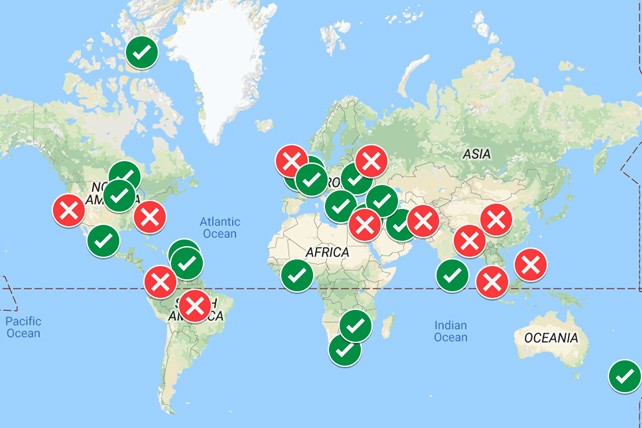When you imagine the Russian drug trade, you probably picture barons or mobsters from movies like Eastern Promises or the unintentionally homoerotic, so-bad-it’s-good ‘80s buddy cop “comedy” Red Heat. But besides a handful of characters such as Boris ‘Biba’ Nayfeld, the tough, tattooed Belarusian-born Brooklynite who once ran heroin from Thailand hidden in TVs, this image is inaccurate.
A new report by the Global Initiative Against Transnational Organized Crime (GI-TOC) on the narco-underworld of Russia and neighbouring countries, which this author helped research, shows how “dope pushers” more often wield keyboards than knuckledusters nowadays.
Searching for treasure on the dark web
Since the 2000s, the Russian and Ukrainian-speaking cyberspaces have been home to a small but thriving online drug culture, where psychonauts traded trip reports and tips on staying alive. Sometime over a decade ago, these forums evolved into fully-fledged narcotic bazaars. Logging in through the dark web, the prospective shopper can browse a head-spinning array of happy chemicals, from Peruvian snowflake cocaine to LSD. Orders are delivered through a series of dead drops, or “treasures,” typically squirreled away somewhere in a park or attached to the inside of a drainpipe with magnets.
“I became acquainted with the treasure system around 2007,” remembered Ukrainian harm reduction advocate Vitalii Lavryk.
“It has become much harder to buy hand-to-hand. The dealer can sell you out to the cops, which happens periodically. There’s hardly any hand-to-hand sales any more. [Besides treasure] you can get delivery in the post, as well as special delivery by taxi for another $5-10 USD.”
“As a rule, VIP shops advertise on several forums at once to attract more customers,” he continued.
“When a shop opens or a new product appears, the sellers themselves offer testers in small quantities, on average from 0.5 g to 2-3 g, to customers with a good reputation, who, having tried the product, write a trip report. There were several deaths from an overdose of methadone, and also people were poisoned with poor-quality amphetamine, and often quite a tester could catch psychosis from alpha-PVP and mephedrone, as well as trying psilocybin mushrooms and LSD.”
Online turf wars & the Russo-Ukrainian War
Once upon a time, Russian and Ukrainian hackers pillaged the internet together, convening in Odesa for the First Worldwide Carders’ Conference in 2002. But hostilities between their countries ended all that.
There are several large online marketplaces in both Russia and Ukraine, plus many smaller operators using Telegram bots. Competition can be intense, but unlike the Rio favelas, no bullet-mangled corpses litter the streets: instead, these cyber-narcos hire hackers rather than hitmen. One of the enforcer gangs in this online turf war are the pro-Russian hacktivists Killnet. Hacktivists are hackers who turn their talents in service of a certain cause – in this case, whatever suits the Botox tsar currently occupying the Kremlin. Among other things, they’ve attacked Elon Musk’s Starlink providing communications for Ukraine, the White House website, and even the Eurovision song contest. But they’ve seemingly branched out into more mercenary exploits.
From at least 2015, the digital drug cartel KhimProm, allegedly led by Russian citizen Egor Burkin, duped Ukrainian migrant workers in Russia into acting as couriers. Shortly after the full-scale invasion in 2022, Russian state media ran a story claiming Ukrainian spooks supplied KhimProm as a hybrid war against Russia, portraying the couriers as working directly for the SBU (Security Service of Ukraine). However, aside from the nationality of some of the suspects, there’s little concrete evidence of a conspiracy leading directly to the SBU itself: most of the narcotics consumed in Moscow and St Petersburg are manufactured in Russia itself, with ingredients from China. But Killnet took this as casus belli to bombard KhimProm’s allegedly affiliated forum, RuTor, with distributed-denial-of-service (DDoS) attacks.
“When I was imprisoned from 2014 to 2015, I saw guys from Ukraine who’d been gathered by the organised crime group,” a convicted weed dealer confided in me.
“Everyone’s story was the same: they were called up from Ukraine and Donbas and put to work in Russia, then they were set up with a master [wholesale] treasure and arrested for article 228 [the anti-drugs law]. The cops were happy, they’d filled their quotas. Fuck, now I understand KhimProm and their massive recruitment over those years. KhimProm is real garbage, that’s why I don’t use RuTor.”
There may be more to the KhimProm conspiracies than mere Kremlin propaganda: reports indicate the syndicate indeed enjoys leeway from high-ranking officials and seeks dominance over Ukraine’s drug trade. The cyber-cartel has expanded rapidly throughout Eurasia by allowing local plugs from as far afield as Kazakhstan and Slovakia to join their “franchise”, like a meth-dealing McDonalds, and even encouraged the public to alert the authorities to their competitors.
As for Killnet, it’s uncertain whether they were truly acting out of patriotism, or the $50,000 donation they received from RuTor’s rivals, Solaris. In any case, Solaris was punished for their Killnet alliance by a Ukrainian-born hacker, who stole US$25,000 from their Bitcoin wallet and donated it to humanitarian causes, like a nerdy version of Omar Little from The Wire.
New forms of violence
As the report notes, technological advances have not left the drug trade completely pacifist. To be hired as a “treasure-man” (the courier who buries the “treasure”), you often have to show ID as insurance. Should you make the foolish mistake of hoarding all those little baggies you’ve been paid to hide for yourself, you’ll shortly face an unpleasant house call from a pair of “sportsmen” — goons hired through the very same darknet websites and Telegram channels. Punishments for absconding with the merchandise include being stripped and humiliated on camera, broken bones and acid attacks, the videos shared online for all to see. So perhaps there’s still some room in the drug game for burly Boris and the boys.


